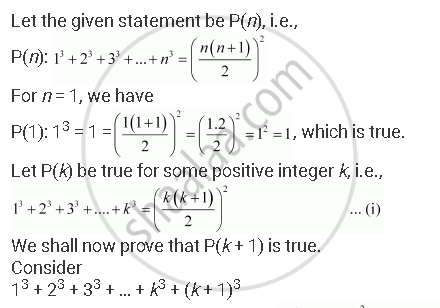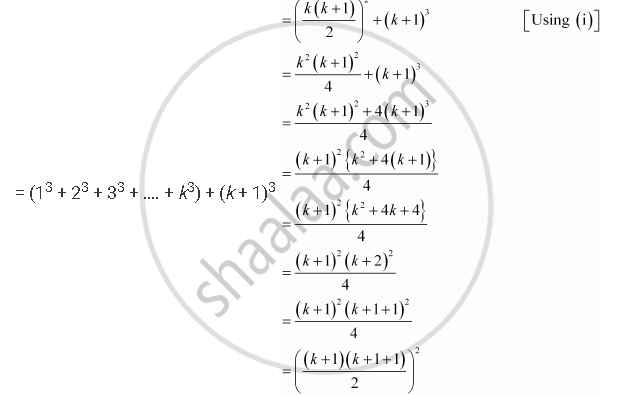Advertisements
Advertisements
Question
Prove the following by using the principle of mathematical induction for all n ∈ N:
`1^3 + 2^3 + 3^3 + ... + n^3 = ((n(n+1))/2)^2`
Solution


Thus, P(k + 1) is true whenever P(k) is true.
Hence, by the principle of mathematical induction, statement P(n) is true for all natural numbers i.e., n.
APPEARS IN
RELATED QUESTIONS
Prove the following by using the principle of mathematical induction for all n ∈ N:
`1 + 3 + 3^2 + ... + 3^(n – 1) =((3^n -1))/2`
Prove the following by using the principle of mathematical induction for all n ∈ N:
Prove the following by using the principle of mathematical induction for all n ∈ N: 1.2 + 2.22 + 3.22 + … + n.2n = (n – 1) 2n+1 + 2
Prove the following by using the principle of mathematical induction for all n ∈ N:
(1+3/1)(1+ 5/4)(1+7/9)...`(1 + ((2n + 1))/n^2) = (n + 1)^2`
Prove the following by using the principle of mathematical induction for all n ∈ N: 102n – 1 + 1 is divisible by 11
Prove the following by using the principle of mathematical induction for all n ∈ N: x2n – y2n is divisible by x + y.
Prove the following by using the principle of mathematical induction for all n ∈ N (2n +7) < (n + 3)2
If P (n) is the statement "n3 + n is divisible by 3", prove that P (3) is true but P (4) is not true.
If P (n) is the statement "2n ≥ 3n" and if P (r) is true, prove that P (r + 1) is true.
12 + 22 + 32 + ... + n2 =\[\frac{n(n + 1)(2n + 1)}{6}\] .
\[\frac{1}{3 . 5} + \frac{1}{5 . 7} + \frac{1}{7 . 9} + . . . + \frac{1}{(2n + 1)(2n + 3)} = \frac{n}{3(2n + 3)}\]
1.2 + 2.22 + 3.23 + ... + n.2n = (n − 1) 2n+1+2
1.3 + 2.4 + 3.5 + ... + n. (n + 2) = \[\frac{1}{6}n(n + 1)(2n + 7)\]
1.3 + 3.5 + 5.7 + ... + (2n − 1) (2n + 1) =\[\frac{n(4 n^2 + 6n - 1)}{3}\]
a + (a + d) + (a + 2d) + ... (a + (n − 1) d) = \[\frac{n}{2}\left[ 2a + (n - 1)d \right]\]
52n −1 is divisible by 24 for all n ∈ N.
52n+2 −24n −25 is divisible by 576 for all n ∈ N.
2.7n + 3.5n − 5 is divisible by 24 for all n ∈ N.
Prove that n3 - 7n + 3 is divisible by 3 for all n \[\in\] N .
7 + 77 + 777 + ... + 777 \[{. . . . . . . . . . .}_{n - \text{ digits } } 7 = \frac{7}{81}( {10}^{n + 1} - 9n - 10)\]
Show by the Principle of Mathematical induction that the sum Sn of then terms of the series \[1^2 + 2 \times 2^2 + 3^2 + 2 \times 4^2 + 5^2 + 2 \times 6^2 + 7^2 + . . .\] is given by \[S_n = \binom{\frac{n \left( n + 1 \right)^2}{2}, \text{ if n is even} }{\frac{n^2 \left( n + 1 \right)}{2}, \text{ if n is odd } }\]
Prove that the number of subsets of a set containing n distinct elements is 2n, for all n \[\in\] N .
\[\text{ A sequence } a_1 , a_2 , a_3 , . . . \text{ is defined by letting } a_1 = 3 \text{ and } a_k = 7 a_{k - 1} \text{ for all natural numbers } k \geq 2 . \text{ Show that } a_n = 3 \cdot 7^{n - 1} \text{ for all } n \in N .\]
Prove by method of induction, for all n ∈ N:
12 + 32 + 52 + .... + (2n − 1)2 = `"n"/3 (2"n" − 1)(2"n" + 1)`
Prove by method of induction, for all n ∈ N:
1.3 + 3.5 + 5.7 + ..... to n terms = `"n"/3(4"n"^2 + 6"n" - 1)`
Prove by method of induction, for all n ∈ N:
(cos θ + i sin θ)n = cos (nθ) + i sin (nθ)
Answer the following:
Prove, by method of induction, for all n ∈ N
`1/(3.4.5) + 2/(4.5.6) + 3/(5.6.7) + ... + "n"/(("n" + 2)("n" + 3)("n" + 4)) = ("n"("n" + 1))/(6("n" + 3)("n" + 4))`
Answer the following:
Prove by method of induction 152n–1 + 1 is divisible by 16, for all n ∈ N.
Prove by induction that for all natural number n sinα + sin(α + β) + sin(α + 2β)+ ... + sin(α + (n – 1)β) = `(sin (alpha + (n - 1)/2 beta)sin((nbeta)/2))/(sin(beta/2))`
Prove by the Principle of Mathematical Induction that 1 × 1! + 2 × 2! + 3 × 3! + ... + n × n! = (n + 1)! – 1 for all natural numbers n.
State whether the following proof (by mathematical induction) is true or false for the statement.
P(n): 12 + 22 + ... + n2 = `(n(n + 1) (2n + 1))/6`
Proof By the Principle of Mathematical induction, P(n) is true for n = 1,
12 = 1 = `(1(1 + 1)(2*1 + 1))/6`. Again for some k ≥ 1, k2 = `(k(k + 1)(2k + 1))/6`. Now we prove that
(k + 1)2 = `((k + 1)((k + 1) + 1)(2(k + 1) + 1))/6`
Prove the statement by using the Principle of Mathematical Induction:
32n – 1 is divisible by 8, for all natural numbers n.
Prove the statement by using the Principle of Mathematical Induction:
For any natural number n, xn – yn is divisible by x – y, where x and y are any integers with x ≠ y.
Prove the statement by using the Principle of Mathematical Induction:
n(n2 + 5) is divisible by 6, for each natural number n.
Prove that, cosθ cos2θ cos22θ ... cos2n–1θ = `(sin 2^n theta)/(2^n sin theta)`, for all n ∈ N.
Prove that `1/(n + 1) + 1/(n + 2) + ... + 1/(2n) > 13/24`, for all natural numbers n > 1.
State whether the following statement is true or false. Justify.
Let P(n) be a statement and let P(k) ⇒ P(k + 1), for some natural number k, then P(n) is true for all n ∈ N.
